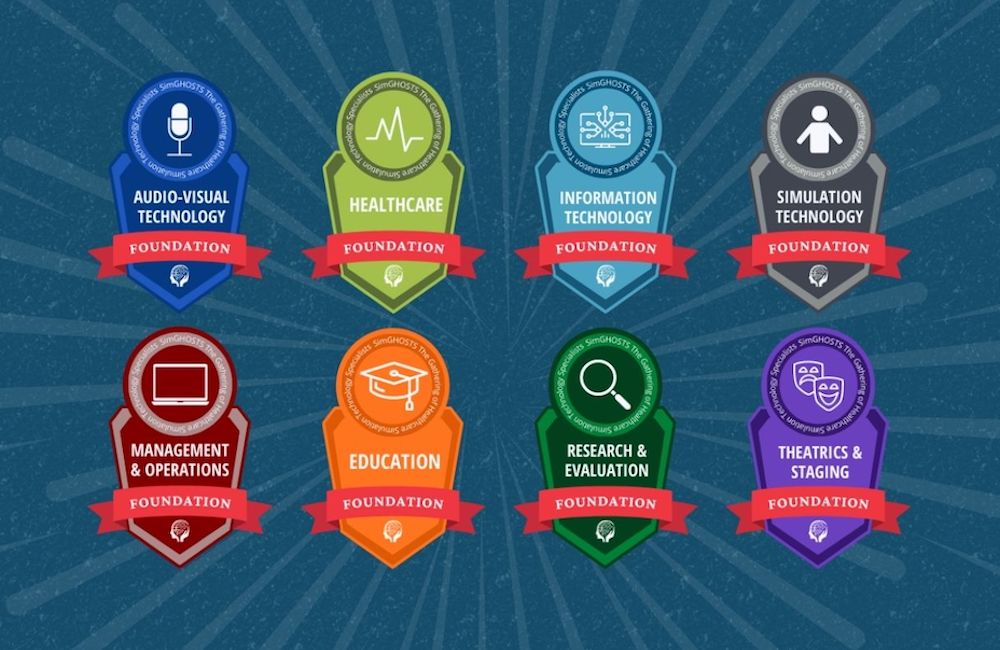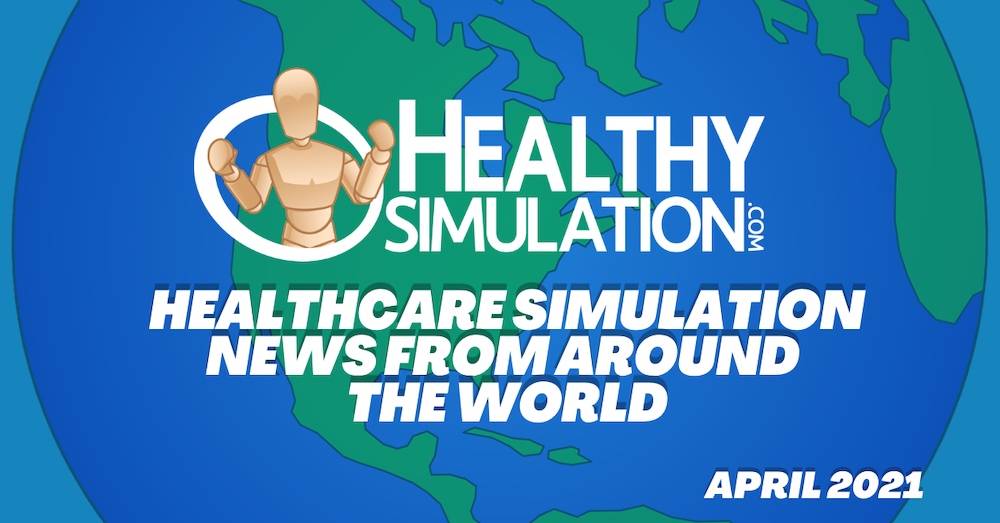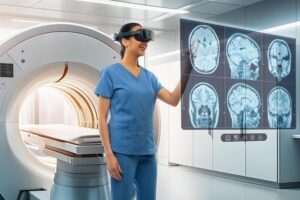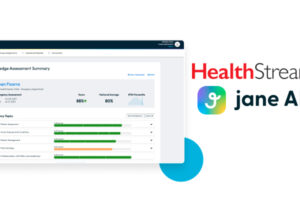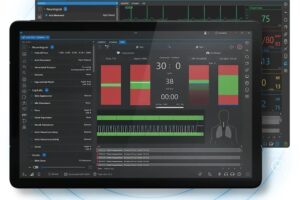SimGHOSTS Digital Badges Help Simulationists Demonstrate Skill Competency
Technological innovations are constantly reshaping how the clinical simulation community is being both educated and trained across the industry. For example, digital badging has developed as a global system of assessment and credentialing that operates entirely online. In this way, a digital badge serves as a graphical representation of achievement embedded with data that conveys to others who issued and received the badge, what the recipient did to earn the badge, standards that were met, and evidence of the achievement. In 2021, The Gathering Of Healthcare Simulation Technology Specialists (SimGHOSTS), the world’s only non-profit organization dedicated to supporting individuals who operate clinical simulation technology, began offering the organization’s own digital badges — which this healthcare simulation article will explore.
In simplest terms, digital badges can be understood much like patches for scouts — demonstrations of skills achieved within a common framework of understanding. Each scout must demonstrate skills to achieve the patch, which can then proudly be displayed to others, but which are limited to the physical sash. What if we could take that same concept, but apply it for any skillset and digitize (or tokenize) the badge for international display and recognition online?
Overall, digital badges are a graphical representation of a person’s competencies, combined with a verifiable description of the knowledge and activities which were taken to earn the badge. Each badge recognizes the learning that takes place in informal settings such as workplaces, conferences and online courses. Recipients can also register a free digital backpack to store and display all of the badges they collect from other OpenBadges issuers, and can download and display badges on their CV, social media accounts, SimGHOSTS member profiles and more. These features make digital badging an ideal format for communicating and verifying skill and knowledge acquisition to current or potential employers.
Sponsored Content:
According to SimGHOSTS, digital badging is ideal because the methodology allows simulationists and learners to better communicate and verify skill and knowledge acquisition to current or potential employers. The unique training opportunities SimGHOSTS provides its members can now be quickly summarized and demonstrated to others, either within the organization or to the greater global community around the world.
To date, SimGHOSTS offers digital badges on the 8 core competencies the organization has identified as important to the professional development of a simulation operator, including Audio-Visual Technology, Healthcare, Information Technology, Management and Operations, Education, and Research and Evaluation. The organization is currently one of the first within the healthcare simulation industry to offer these types of digital badges.
Each digital badge shows who earned the badge, how the badge was earned, who issued the badge, and evidence of applicable work. The credentials also possess details such as badge name, badge criteria, badge URL, issue date, issuer, and the recipient. Currently, learners can earn a badge by taking one of SimGHOSTS’ five ‘Essentials’ online courses in the organization’s Learning Hub. They can also consider attending a SimGHOSTS conference or presenting at a SimGHOSTS conference to earn these badges.
Another benefit of digital badges is that learners who achieve them can add them to their professional networks (LinkedIn, Facebook, etc..), online job bank, resume, email signature, and in the SimGHOSTS member portal, just to name a few places. These digital badges can help simulationists take their healthcare simulation knowledge and career to the next level.
Sponsored Content:
As digital badges are becoming increasingly more popular across training and professional development, many major universities, government organizations and employers such as Microsoft, IBM, and Salesforce issue digital badges to recognize learning and professional development. This is because digital badging helps identify specific skill sets, rather than general knowledge. As this method of credentialing becomes more commonplace, employers will begin to review and require digital badges for all current and future employees.
HealthySimulation.com Webinar: “Badging for Clinical Simulation Operations: What? Why? How?
Presented by: Suzan Kardong-Edgren Ph.D., RN, ANEF, CHSE, FSSH, FAAN, this HealthySimulation.com webinar explains bdigital badges in healthcare simulation, the newest way to demonstrate skills in a recognized manner without attending formal higher education. Badges or microcredentials are currently being used extensively in businesses outside of healthcare to document newly gained skills. Simulation is just beginning to dip its collective toe in the badging waters.
Badges might appeal to simulationists and sim operations professionals because the role often does not fit into the predefined boxes created by current institutions of higher learning. Badging could prepare these non-traditional learners and those without the time or funds to attend traditional academic programs to demonstrate continued skill acquisition and competency in a new manner gaining popularity across the world.
This presentation will discuss what badges are, why they are being used in the place of more traditional education, how they are earned, and what sources of badging exist for simulationists now. Learning objectives include:
- Learners will be able to describe badging.
- Learners will be able to explain why badging is growing as an alternative to traditional education.
- Learners will be able to name two potential sources for badging in simulation.
More About SimGHOSTS
SimGHOSTS, also known as The Gathering Of Healthcare Simulation Technology Specialists, is an international United States-based non-profit organization. The organization is dedicated to supporting individuals and institutions operating medical simulation technology and spaces through hands-on training events, online resources and professional development.
By offering support and resources to medical simulation professionals, SimGHOSTS hopes to create a healthcare education culture where people are empowered to use simulation technology to improve learning and patient care outcomes. For this reason, SimGHOSTS has created six core values, the first of which is to innovate the world of healthcare simulation and patient safety.
Other organizational core values include advocating for those operating healthcare simulation technology spaces, educating the professional community to improve outcomes and networking with global community members at regional events and online hubs. The last two core values are to engage champions, institutions and organizations, and zeal for the craft of simulation in healthcare throughout the community and profession.
Learn More About SimGHOSTS Digital Badges
Lance Baily, BA, EMT-B, is the Founder & CEO of HealthySimulation.com, which he started while serving as the Director of the Nevada System of Higher Education’s Clinical Simulation Center of Las Vegas back in 2010. Lance is also the Founder and acting Advisor to the Board of SimGHOSTS.org, the world’s only non-profit organization dedicated to supporting professionals operating healthcare simulation technologies. His co-edited Book: “Comprehensive Healthcare Simulation: Operations, Technology, and Innovative Practice” is cited as a key source for professional certification in the industry. Lance’s background also includes serving as a Simulation Technology Specialist for the LA Community College District, EMS fire fighting, Hollywood movie production, rescue diving, and global travel. He and his wife Abigail Baily, PhD live in Las Vegas, Nevada with their two amazing daughters.
Sponsored Content:



